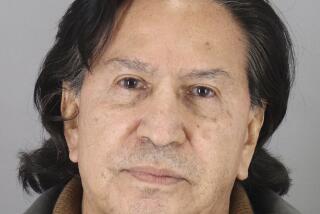Lawyer Says Leave Pinochet to Chile
- Share via
LONDON — Lawyers fighting Gen. Augusto Pinochet’s extradition to Spain on torture and genocide charges told Britain’s highest court Monday that Chile alone should be allowed to decide the fate of its former dictator.
Attorney Clare Montgomery warned that Pinochet’s arrest and detention in a London clinic threatened the stability of Chile and, therefore, that the panel of five law lords must strike a “delicate balance” between demands for justice and Chile’s need for national reconciliation.
“We submit that your lordships will be expressing a view on the internal arrangements which assured a peaceful transition to democracy [in Chile],” Montgomery said.
She noted that at least 11 lawsuits are pending against Pinochet in Chile, stemming from the deaths or disappearance of more than 3,000 people during his 17-year rule, and that the courts there should determine whether he is entitled to immunity as a senator-for-life.
Pinochet, 82, was arrested Oct. 16 on a warrant from a Spanish magistrate seeking to try him in Madrid for the crimes committed after he toppled the elected Socialist President Salvador Allende in a bloody coup in 1973. Spanish citizens were among those who died or disappeared in the aftermath of the coup.
“Countries must be allowed to arrange their own affairs,” Montgomery said, adding that to deny Pinochet immunity would be to encourage future despots to remain in power.
Montgomery made the arguments on the third day of an appeal by the Crown Prosecution Service against a decision by London’s High Court last month that Pinochet’s arrest was illegal.
The court said he is entitled to immunity from prosecution because he was a head of state when the abuses were committed.
No one in either courtroom has tried to deny that the widespread human rights abuses took place. Rather, Montgomery reiterated the Pinochet defense position that, if any acts of torture or mass murder took place, they were done “within governmental authority, under orders to the military or government forces . . .” and while Pinochet was head of state, which, therefore, would make him immune from prosecution.
Britain’s Crown Prosecution Service, on behalf of the Spanish government, has argued that Pinochet’s crimes were so widespread and heinous as to constitute “crimes against humanity,” which cannot be protected by immunity under international law.
Ian Brownlie, a law professor speaking on behalf of Amnesty International and other human rights groups, said Monday that Pinochet could not claim immunity under either international or British law, which he said do not apply to former heads of state and which exclude criminal proceedings.
Chilean legislator Juan Pablo Letelier, whose father was assassinated in a 1976 car bomb attack in Washington, D.C., organized by Pinochet’s intelligence forces, rejected Montgomery’s argument for impunity, saying there was “no arrangement, no agreement, no settlement” in Chile that Pinochet should enjoy immunity from prosecution.
Letelier’s father, Orlando, was Allende’s foreign minister until the coup and was an outspoken critic of Pinochet.
Juan Pablo Letelier also dismissed a statement issued by Pinochet over the weekend as a demonstration that the former dictator has not made “even the most minor gesture of repentance for the brutal acts he committed during his government. He simply ignores them.”
In a statement published Sunday, Pinochet said that “a show trial in a foreign land is not justice.” About Chile’s grim past, he said, “I wish things could have been different. . . . But I am at peace with myself, and with the Chilean people, about what happened.”
Arguments in the House of Lords court are to continue this afternoon and conclude this week. It is unclear when the senior Law Lords will reach a decision. If they rule against Pinochet, it would then be up to Britain’s home secretary to decide what to do with the ex-dictator.
More to Read
Sign up for Essential California
The most important California stories and recommendations in your inbox every morning.
You may occasionally receive promotional content from the Los Angeles Times.













